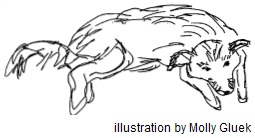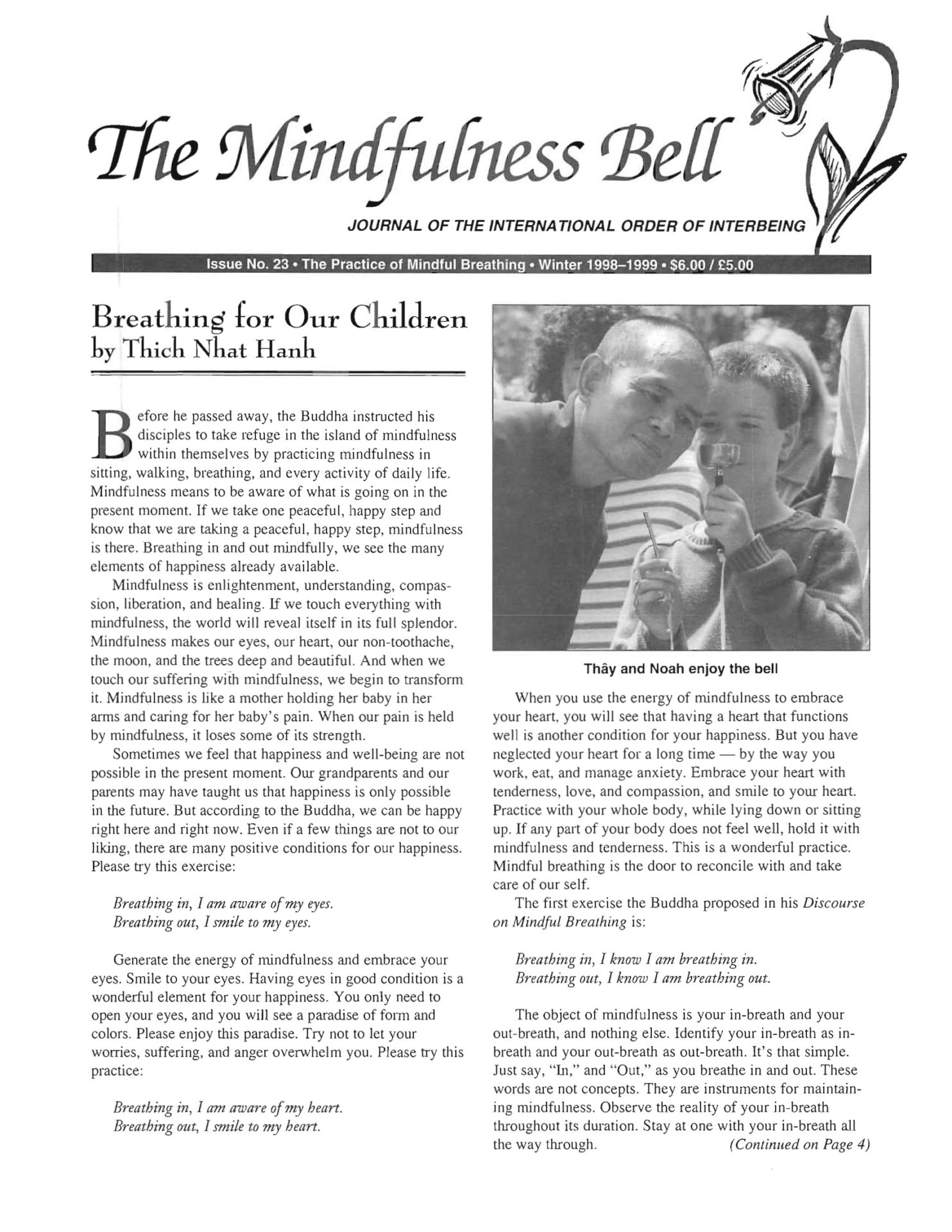By Stephen Hyde
One of the most helpful teachings I have learned from Thich Nhat Hanh is that sometimes the best expression of our practice is a formless one. This encouragement to be formless made all the difference in my ability to sustain a practice within my home and family at a time when more overt expression would only have served to divide us. By taking practice underground, I was able to sustain it through some lean,
By Stephen Hyde
One of the most helpful teachings I have learned from Thich Nhat Hanh is that sometimes the best expression of our practice is a formless one. This encouragement to be formless made all the difference in my ability to sustain a practice within my home and family at a time when more overt expression would only have served to divide us. By taking practice underground, I was able to sustain it through some lean, Sangha-less years. I was able to weave my practice in a seamless and natural way into the evolving fabric of family life and relationship. Keeping the practice largely formless allowed my family to evolve our own practice---one "native to the grain" as Robert Frost would say-a practice that is genuine and loving, not just something extra in our lives. Loving speech has been a mainstay of this formless practice. In a formless world, it is often the whole of practice.
Loving speech is not just the words we speak or refrain from speaking. It is the reflection and habit of our mind, the nurturing silence we embody. Loving speech is the spirit of great generosity and compassion with which we listen to our world, the tender eyes with which we look upon our world, and our deep commitment to non-harming.
I have learned much about loving speech from the silence of my daughter. At the age of 18, she has an expressive vocabulary of perhaps 50 words, more than half of which are unintelligible to the untrained ear. When she is really ripped at me, the nastiest, most cutting word that she can hurl at me is a garbled version of "bathroom"! It is as close to cussing me out as she comes. For her well-being, I have to be ready to hear the whole of "bathroom"-both what is said and what is unsaid, what for her is forever unsayable.
On the other hand, when she is delighted, at one with this background of stillness, at peace with her world, she is apt to hug me or stroke my face gently with soft, twisted fingers and utter: "Minge, minge!" I don't know if there is an adequate translation for it. "Minge" is just the tenderest, most heartfelt, and most comforting thing that she can say. Her term of greatest endearment, her highest expression of complete and abiding love-reserved for the most special moments-is "Minge, beejo!" Again, I can't say what it means, only that it is truly transformative to be so wholeheartedly embraced by that sound when she speaks it. It is a kind of blessing, like hearing the name of Avalokiteshvara invoked on one's behalf. It is a healing sound, and her speaking it'is a healing action. The freshness of her approach to language, her capacity to speak her whole being so completely, her trust in the sound-however mangled to the indiscriminate ear-to carry and convey the true sense of her heart invites me always to stay open to the true nature of loving speech-both as I continue to learn how to listen for it and how to offer it to my world.
My daughter has incredible radar for angry or unskillful speech. She makes no pretense of being untouched by harsh speech; she doesn't put up a facade and pretend to be unaffected. She collapses into a puddle on the ground, wherever she is-whether she is the object of the speech or an innocent bystander: In this, she reminds us that unmindful speech is not an individual matter, that unskillful words travel to the furthest reaches of our families, our communities, and the cosmos.
Within my family and my community, I have worked to refrain from uttering words that cause division and discord and have seen how helpful that can be. However, sometimes what I refrain from uttering is what I believe to be the truth. It is a delicate point of balance, that, at times, leaves truth feeling a little buried.
Loving speech is not always truthful nor is truthful speech always loving. And sometimes silence can hold truth and love far better than speech, better than speaking out about a perceived injustice (especially when I don't check to make sure my perception is accurate.) The risk I run by not speaking out is encouraging a tacit kind of censorship: that harmony in the family or community be seen as more important than speaking out about injustices. I have not yet found an easy answer. Sometimes the answer seems to be more truth, sometimes more words of support and confidence, sometimes greater silence. But I sense the potential for grave danger if truth is too often superseded by the desire for harmony and if the appearance of harmony is valued more than acknowledging and healing the many injustices-intentional and unintentional-that arise out of a shared life.
Perhaps in the practice of truthful and loving speech I must be willing to accept the necessary wounding or rending of family or community as the way that leads to deeper integration and healing, just as, in our determination not to kill or to let others kill, we understand that in order to live, we must kill. And in the course of this living, we must yield everything to our essential and dynamic relationship with life in this moment, accepting with true humility the very wound of life itself-the wonder, the terror, the beauty, the pain, the awe, and the responsibility, the inescapable responsibility we bear for nurturing all things, all beings, all unfolding.

Stephen Hyde, True Jewel of Goodness, lives with his family in Pownal, Maine.

